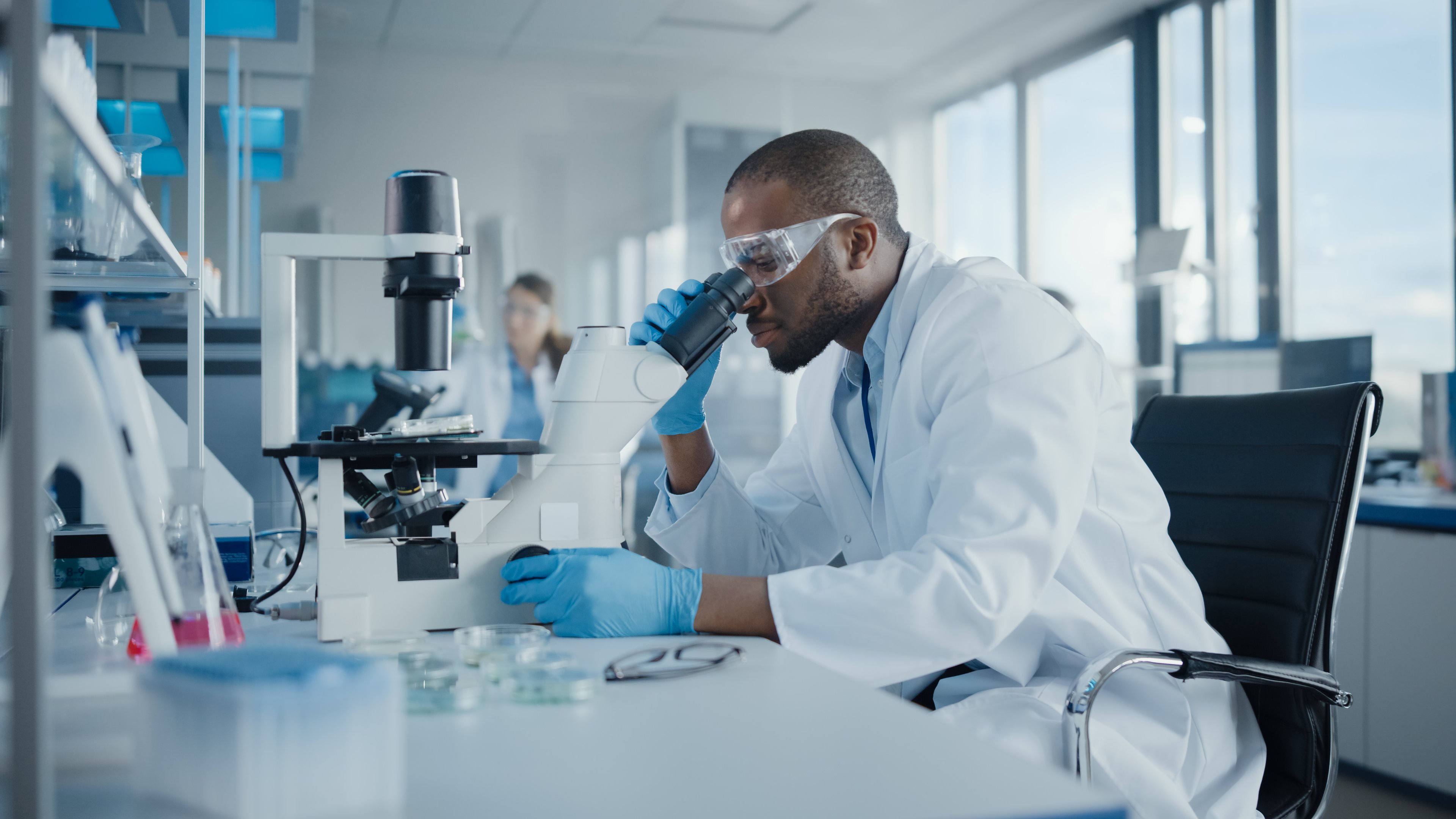In the past year, Gilead Sciences has won approval of a gene therapy that rewrites cells from a patient's immune system so that they can track down and destroy cancer cells, while Spark Therapeutics has won approval for a therapy that restores vision by inserting a new functioning gene in people who are blind because of a rare genetic mutation. These discoveries (and others still to come!) wouldn't have been possible without lessons learned from the Human Genome Project, a $3 billion program started in the 1990s that sequenced human DNA for the first time.
In this clip from Industry Focus: Healthcare, host Kristine Harjes is joined by Motley Fool contributor Todd Campbell to discuss how the discovery of more than 20,000 genes cleared the way to life-changing new drugs.
A full transcript follows the video.
This video was recorded on June 27, 2018.
Kristine Harjes: We've already spent a bunch of time speculating about the future and the next 25 years. Now, we're going to get back in that time machine once again and go back -- actually, a little bit more than 25 years -- to the launch of the Human Genome Project. This kicked off in 1990. It was the beginning of a tidal wave of advancement in gene sequencing. Todd, can you give us a primer, to begin with, about what that project even has to do with anything?
Todd Campbell: DNA is like a blueprint for how our bodies work. Our understanding of how our bodies work really has been quite limited up until the 1990s, when they engaged in this massive program to go out and try and sequence the entire human genome, and be able to map it out in ways that allow us to then dive in and look for discoveries in what genes produce what proteins, and how can we manipulate those genes in ways to come up with treatments, or personalized or precision medicines, which is where we are at today.
At the time, it was a massive undertaking. The costs that were projected to be associated with putting this project together stretched into the billions of dollars. We're talking about a decade worth of research to do something that, I suppose, now you could do with a flip of a switch. But, at the time, incredibly game-changing. Now, the fruits of that labor are being borne out. One of the most important, I think, projects undertaken in the last 25 years.
Harjes: Absolutely. That project got everything started when it came to a better understanding of the human genome. That was a publicly funded project. There were also private efforts at play here. In 1998, a company called Solexa was founded, which was eventually bought out by Illumina (ILMN 1.53%), another name that we talk about on the show all the time. They purchased Solexa in 2006.
Something that Illumina's investor materials reference all the time is something called Moore's Law, which is this concept borrowed from the tech world. It has to do with the processing power of computers roughly doubling every year. It's basically a benchmark of an incredible pace for progress. Illumina references this pretty frequently, because their technology has outpaced Moore's Law, which is already held up as this standard of incredible pace for advancement. They've done even better.
Their most recent sequencer that they launched just this year holds the promise of a $100 sequence. When you think about the fact that the Human Genome Project cost roughly $3 billion, that's an insane advancement. It gives us a really fun platform to then talk about our projections for the future. What are we going to do with all this data?
Campbell: $3 billion, and now we're talking less than $1,000. I mean, that's just amazing. It goes to show you one way how big spending upfront can spark an entire development of an industry -- an industry, obviously, now, that's resulting in the development of incredible advances in patient treatment across the number of different diseases.
Back in 2001, Francis Collins, who at the time was the director of the National Human Genome Research Institute, the people behind this project, he described the work that they were doing as a book. "A history book -- a narrative of the journey of our species through time. It's a shop manual, with an incredibly detailed blueprint for building every human cell. And it's a transformative textbook of medicine, with insights that will give healthcare providers immense new powers to treat, prevent, and cure disease." That was in 2001.
Now, today, in 2018, we're already benefiting from the launch of gene therapies. They're revolutionary in what they're doing for patients. Luxturna -- which you and I, Kristine, have talked about on the show before -- jumps to mind as one, a gene therapy that's used to restore vision in people by replacing a gene that is mutated and faulty with one that works properly. We've also seen advances in gene therapy in cancer care. Over the course of the last year, the approval of Yescarta and Kymriah, CAR-T drugs that actually take T-cells out of patient's bodies, reengineer them, and then put them back in the body so that they can go out and find and destroy cancer. It really is quite a remarkable decade of discovery that's now proving out into these treatments that I think are going to really be life-saving for so many people. And that pace is going to accelerate, Kristine, I think.
Harjes: I agree. I also think that there are consumer applications that you will see coming out every single day at a really incredible pace. When you think about how gene sequencing stands right now, most people are getting this information through companies like 23andMe. They're mostly interested in their ancestry reports. But more and more applications are becoming available. Things like your physical fitness, or things like dietary responses in your body that maybe you didn't know about until you were able to receive this data.
Illumina actually founded a company called Helix. Its whole goal is to create this central repository where it has your sequenced genome. Then, there are apps layered on top of it, where if you want that information about, maybe, genetic information about how you should restrict your diet or what have you, that could be an application that sits on top of that central repository, and you can access it to get the information that you want.
I think there's an even broader point to be made here about access to data. Right now, it's kind of tough to get your medical records. Information about your body that's so, so personal is locked away in these not-interoperable medical records. It feels like you don't really own or have access to your own information. Genetic information is just one component of that. I see a broader trend toward democratization of data. I think, in healthcare, people will demand it at a certain point. They will demand that they have ownership of their information, and that they have convenient access to their data.
We're seeing this a little bit already with stuff like the iPhone's Health app. We're seeing more and more companies that are interested in fixing the EHR space and making it so that your medical records are able to talk from one doctor's office to another. But I think we still have a long way to go.
Campbell: We absolutely have a long way to go. I want to say it's kind of embarrassing, given the access that we have to data right now in our personal lives, and how easily we can share that with everybody, both intentionally and unintentionally, right, Kristine? I think, one of the things that we're going to have to try and figure out is almost some sort of a blockchain-type system for allowing that access to be verified, and then freeing all that information to flow without having to have, say, a HIPAA release signed by every person who may view it. You could go into a blockchain and say, "There's a HIPAA release here, it's obviously been approved for everybody," and then being able to share that across any kind of system to try and come up with some of these. I have a hard time believing, Kristine, that that's not where we're heading.
We're going to be, eventually, in a world where everybody is going to have their genomic profiles somewhere; that we'll be able to analyze that genomic profile for early intervention, preventative or predictive. And, all of the data is going to be able to be leveraged by AI in ways that allow us to make sure that the right treatment is getting to the right person, at the right time. It truly is going to be a pretty exciting time. I think that genomics, and the work that was done on the Human Genome Project going back all the way into the early 90s when -- The Motley Fool was just being born -- I think that is what's facilitating, really, all of this.
Harjes: And things will move slowly. They'll continue to be frustrating. By the time we have interoperable medical records figured out, there will be some new advancement that's proliferated the other sectors, probably, and we'll be exasperated that healthcare hasn't caught up. But it's so apparent that the wheels of progress are continuing to turn. As investors, we should look to the companies that have a great vision for the future and are making progress toward it.
Campbell: Absolutely. 100% agree, Kristine. We mentioned a couple of them on the show already. Teladoc is one, in telehealth, earlier on in the show. Apple's doing some pretty exciting things. Illumina is obviously a very intriguing company, and so is Intuitive Surgical. All of those are companies that have me thinking they can benefit from multi-decade trends.
Harjes: Yeah. It's one of the privileges of being an investor -- you get to be a part of this in some small way. Watching it is a lot of fun, too.






